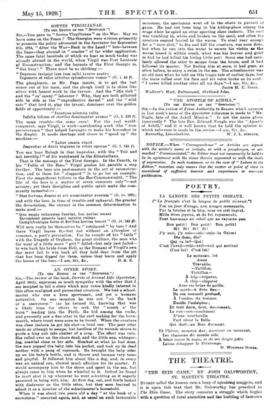SORTES VIRGILIANAE.
[TO TM EDITOR OP "PRE "SPECTATOR.")
&n,—Yon gave us "Sortes Virgilianae" on the War. May we have some on the. Peace? The Georgics were written primarily to promote the policy advocated in the Spectator for September 0th, 1916, ".After She War—Back to the Land t "but—between the lines—they abound in" oracles" of far wider application. The same fatal lassitude of which we hear to much to-day was already abroad in the world, when Virgil was Poet Laureate of Reconstruction; and the keynote of the First Georgic is, 4' Get busy!" There must be no shirking :—
" Depress.) incipiat lam turn roihi taurus aratro
Ingemere et wilco attritus splendescere vomer " (G. i. 45 I).
The ploughman, as Mr. Page insists, is to get the last ounce out of his team, and the plough itself is to shine like silver with honest work in the furrow. And -the "idle rich" and the "ca' canny" labourer ? Why, they are both pilloried aide by side as the "unproductive darnel" and the "wild oats" that lord it, play the tyrant, domineer over the golden fields of opportunity :—
" Interque nitentia culta Infelix lolium et sterile-s dominantur avenae" (G. i. 153 j).
The same trouble—the same cure! For the real world- conqueror, says Virgil, is work—unrelenting work (the " iron perseverance" that helped Lavengro to make his horseshoe in the dingle). It needs shortage and stress to speed up" the machine:— "Labor omnia vincit Improbus et dens urguens in rebus egestas" (G. i. 145 1).
You can hear Ralegh in that improbus, with the "Toil and toil terribly!" of his watchword to the Elizabethans.
That is the message of the First Georgic. In the Fourth, in his ".Fable of the Bees," Virgil pushes his parable a step further. The bees are past-masters in the art of reconstruc- tion, and to them his "sluggard" is to go for an example. First the magnificent tribute to the Bee-Commonwealth. "The life of the bees is a matter of seven summers only"—not seventy; yet their discipline and public spirit make the com- munity immortal :— , "Stet fortune domes et avi numerantur avorum" (G. iv. 209); and with the bees, in time of trouble and upheaval, the greater 'the devastation, the sterner is the common determination to make good :— "Quo magis exhaustae fuerint, hoc stories ontnes Incumbent generis lapsi sarcire rubies
Cemplebuntnue force et floribus horrea texent " (G. iv. 248 if). Will men really let themselves be "outclassed" by bees ? And there Virgil leaves it,—but not without an afterglow of romance, a poet's peroration. For he rounds Of his "fable" with the Tragedy of Orpheus, the great civilizer, the man who for want of a little more "grit" failed—but only just failed— to win back his bride from Hell, as the Romans of Virgil's own day must fail to win back all they hold dear from the pit that has been dined for them, unless they learn and apply
the lesson of the bees.—I am, Sir, Ike, D. A. S.










































 Previous page
Previous page